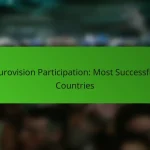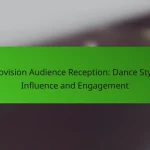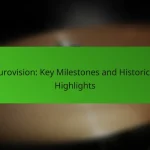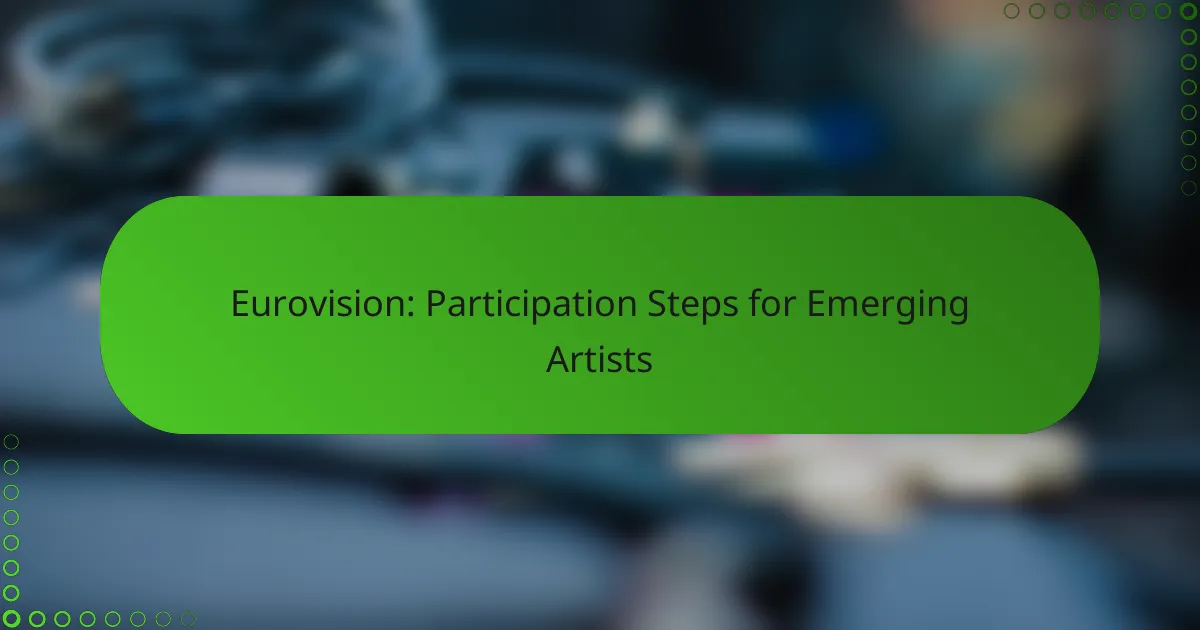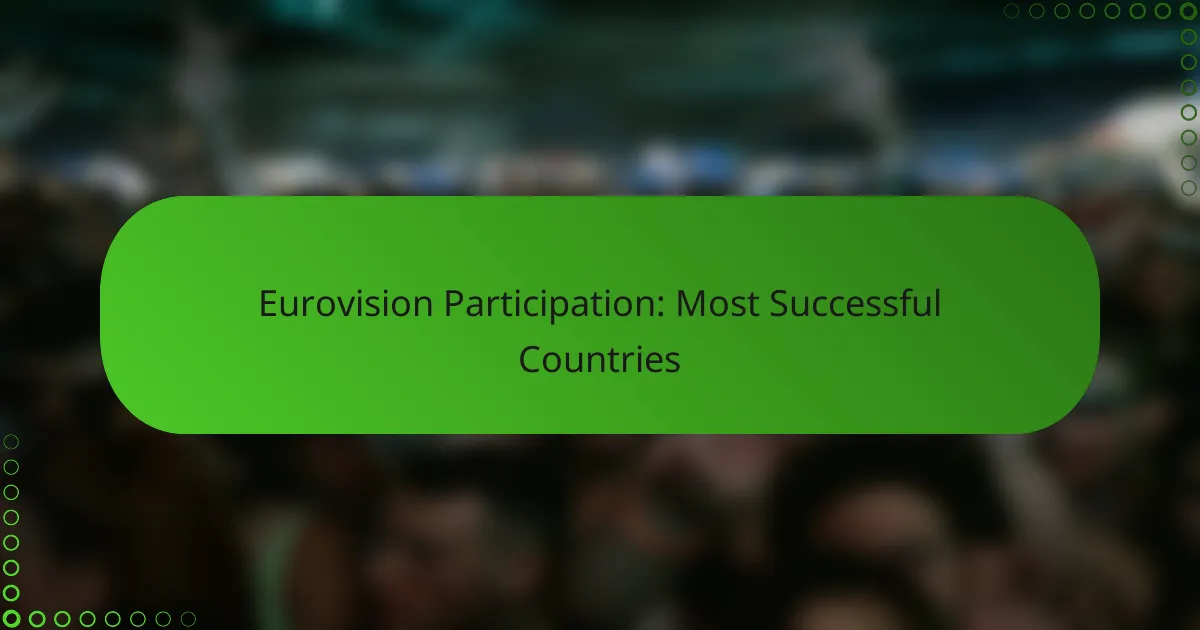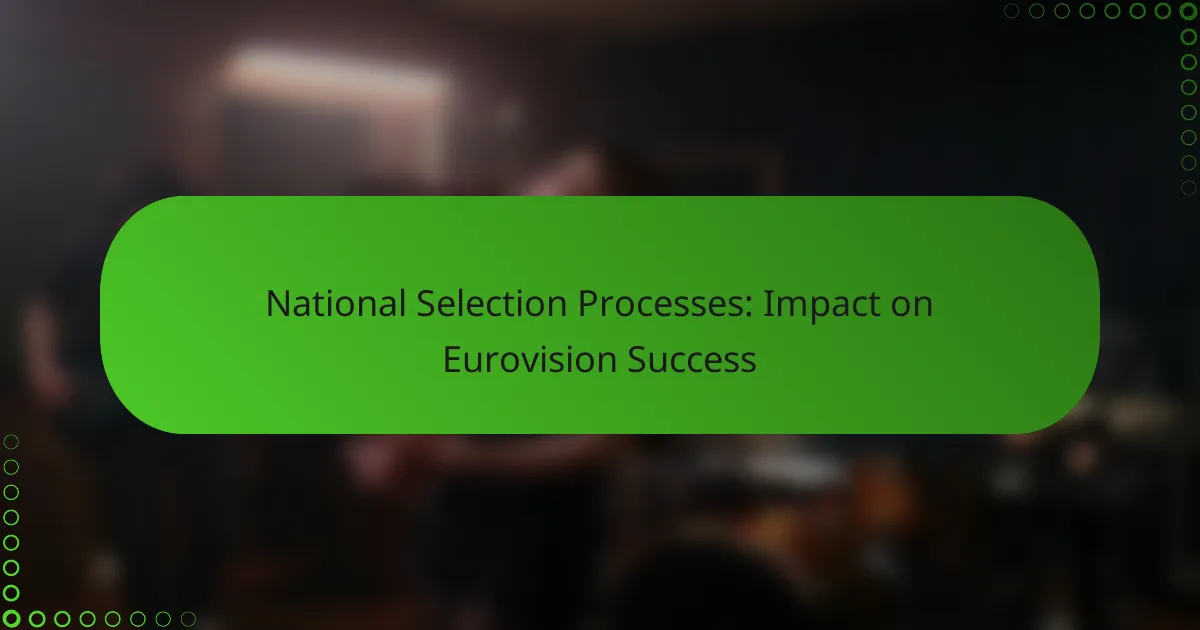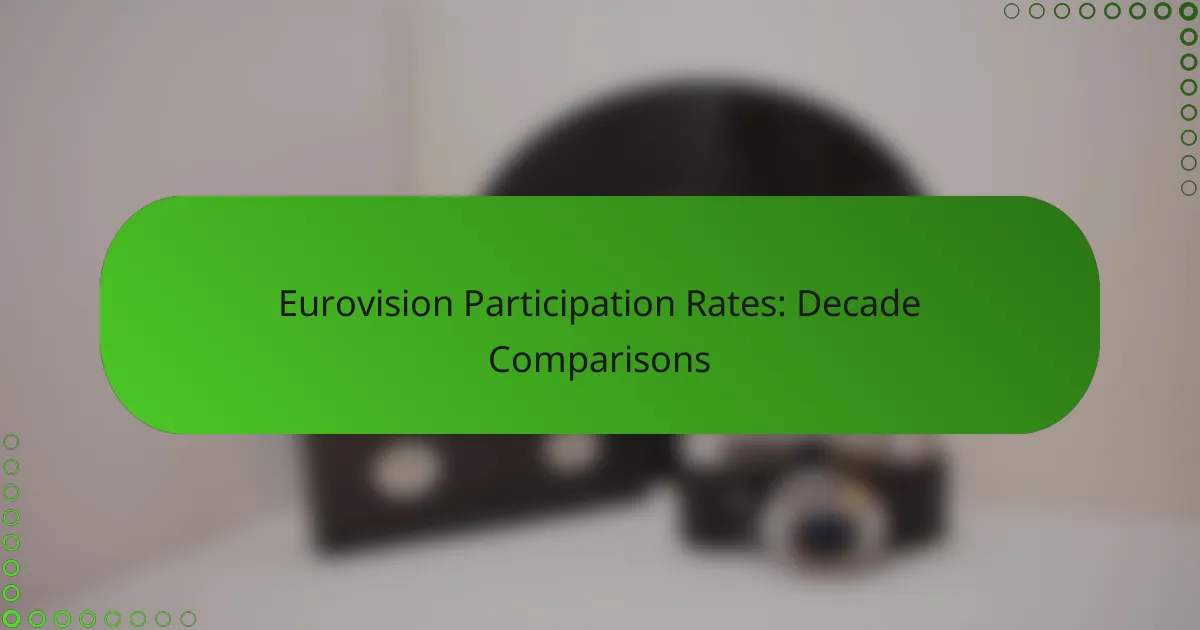Emerging artists looking to participate in Eurovision 2024 can do so by entering national selection competitions or partnering with established music labels. Each country has its own unique process, making it vital for aspiring participants to understand the specific eligibility criteria and submission requirements. By following the necessary steps, including songwriting and adhering to guidelines, artists can position themselves for a chance to showcase their talent on an international stage.
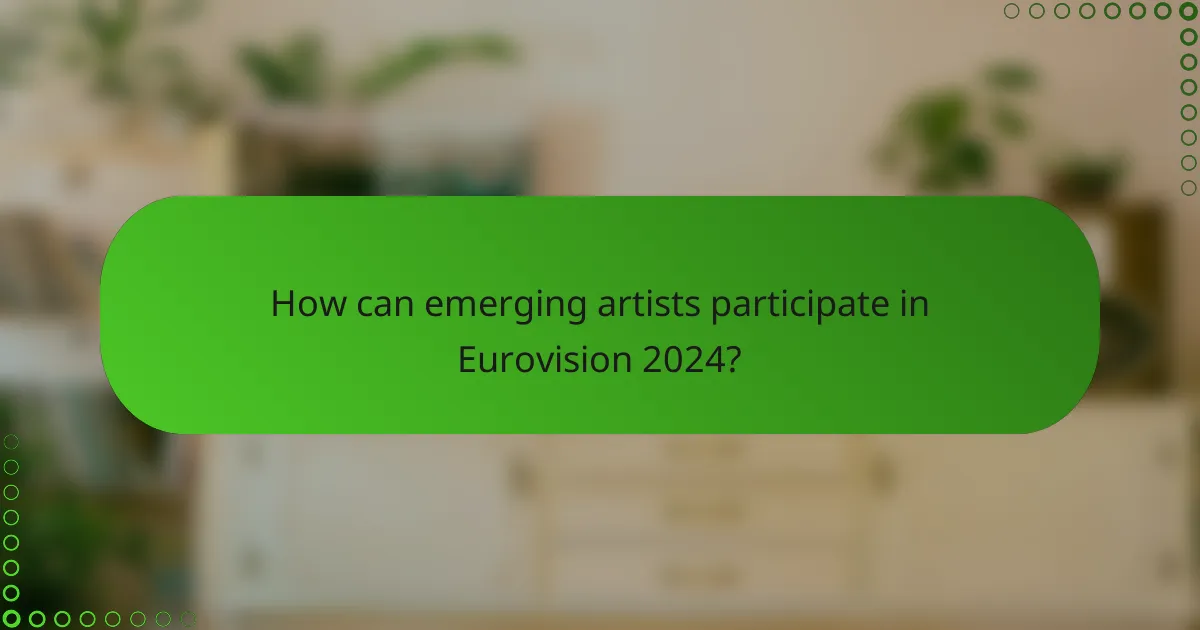
How can emerging artists participate in Eurovision 2024?
Emerging artists can participate in Eurovision 2024 through various pathways, primarily by entering national selection competitions or collaborating with established music labels. Each country has its own process, so understanding the specific requirements and opportunities is essential for aspiring participants.
Registration through national selection
Most countries hold national selection contests to choose their Eurovision representatives. Emerging artists should research the specific rules and deadlines for their country’s selection process, as these can vary significantly.
Typically, artists must submit their songs and applications by a certain date, often accompanied by a demo recording. It’s crucial to ensure that the song meets the eligibility criteria set by the national broadcaster, including length and originality.
Participating in these contests can provide valuable exposure, but competition is often fierce. Artists should prepare to promote their entries through social media and local events to garner public support.
Direct entry via established music labels
Some emerging artists may have the opportunity to enter Eurovision directly through established music labels. This route often requires a contract with a label that has a history of Eurovision participation.
Artists should seek out labels that are actively scouting for new talent and express interest in Eurovision. Building a strong portfolio and networking within the music industry can enhance chances of being noticed by these labels.
While this path can offer significant support, it may also come with higher expectations and less creative control over the final entry. Artists should weigh the benefits of label backing against their artistic vision.
Collaboration with local artists
Collaborating with local artists who have experience in Eurovision can be a strategic way for emerging talents to gain entry. These partnerships can provide insights into the competition and enhance the quality of the submission.
Artists should look for opportunities to co-write or perform with established musicians within their region. This not only improves their chances of success but also helps build a network that can be beneficial for future projects.
When collaborating, it’s essential to discuss roles and expectations upfront to ensure a smooth working relationship. Clear communication can help avoid misunderstandings and foster a productive creative environment.
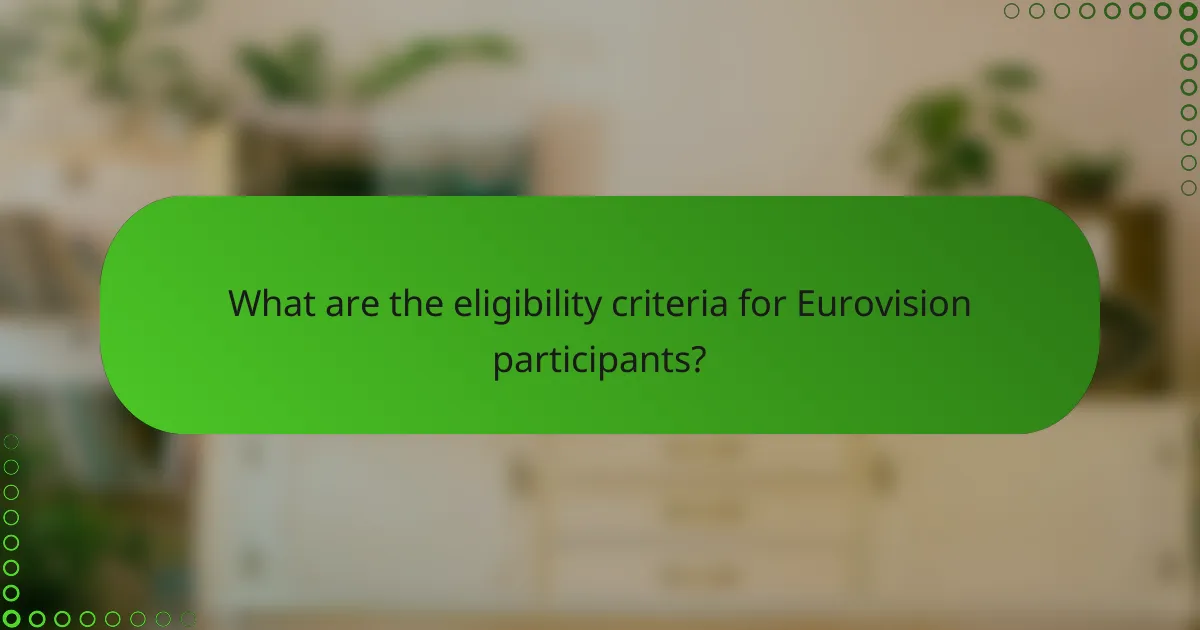
What are the eligibility criteria for Eurovision participants?
To participate in Eurovision, artists must meet specific eligibility criteria that include age, nationality, and residency. These criteria ensure that performers represent their countries authentically and comply with the competition’s regulations.
Age requirements for performers
Performers must be at least 16 years old on the day of the contest to be eligible to compete. This age requirement applies to all artists, including solo acts and members of groups. It’s essential for emerging artists to verify their age before applying, as there are no exceptions to this rule.
In some cases, countries may have additional internal selection processes that could impose stricter age limits. Therefore, checking with the national broadcaster is advisable for specific details.
Nationality and residency rules
Artists must represent a country that is a member of the European Broadcasting Union (EBU) to participate in Eurovision. This includes countries within Europe and some outside of it, such as Australia. Additionally, performers must have a strong connection to the country they represent, which can include citizenship or long-term residency.
It’s crucial for artists to confirm their eligibility with their national broadcaster, as rules regarding nationality and residency can vary. Some countries may require proof of citizenship or residency documentation, so preparing these documents in advance can streamline the application process.
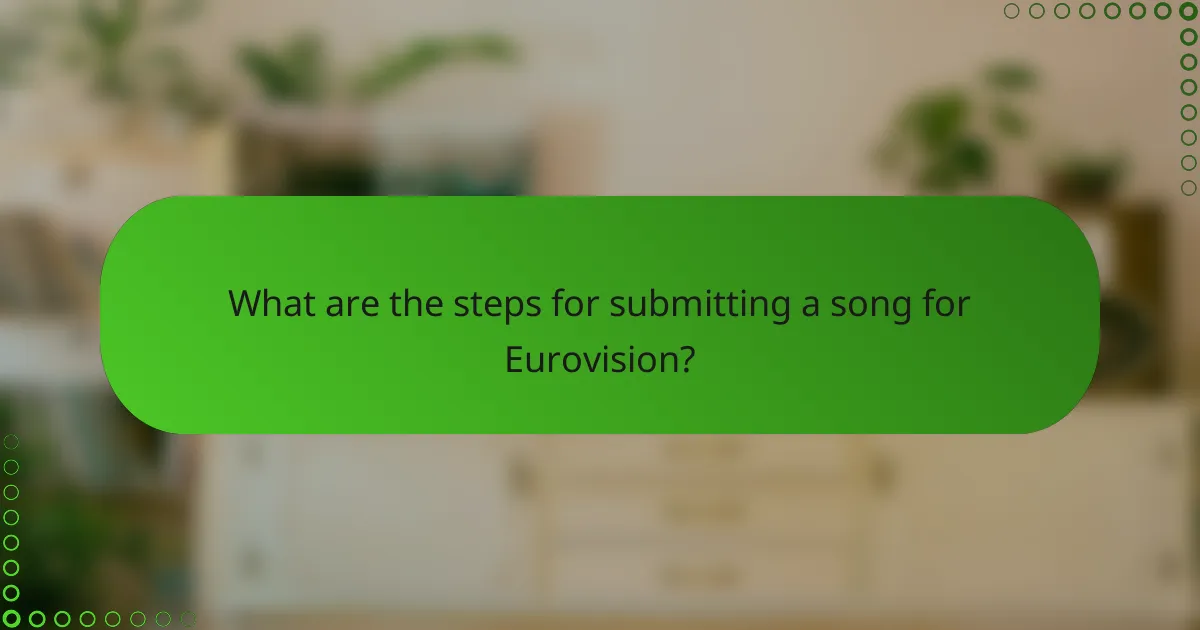
What are the steps for submitting a song for Eurovision?
To submit a song for Eurovision, artists must follow a series of steps that include songwriting, adhering to specific guidelines, and meeting submission deadlines. Understanding these requirements is crucial for emerging artists aiming to participate in this prestigious competition.
Songwriting and composition guidelines
Eurovision songs should typically be original, with a duration of no more than three minutes. The composition must appeal to a broad audience while showcasing the artist’s unique style. It’s advisable to incorporate catchy melodies and relatable themes to resonate with both the jury and viewers.
Additionally, songs should be performed in one of the official languages of the participating country, although some exceptions may apply. Artists should ensure that their lyrics are suitable for a family audience, avoiding explicit content or controversial topics.
Submission deadlines and formats
Each participating country sets its own submission deadlines, usually falling between late autumn and early winter. Artists should check the official Eurovision website or their national broadcaster for specific dates and requirements. Late submissions are generally not accepted, so planning ahead is essential.
Submissions typically require a digital format, such as an MP3 file, along with a completed application form that includes details about the artist and the song. Some countries may also request a video performance or a demo recording. Ensuring compliance with these formats is crucial for a successful entry.
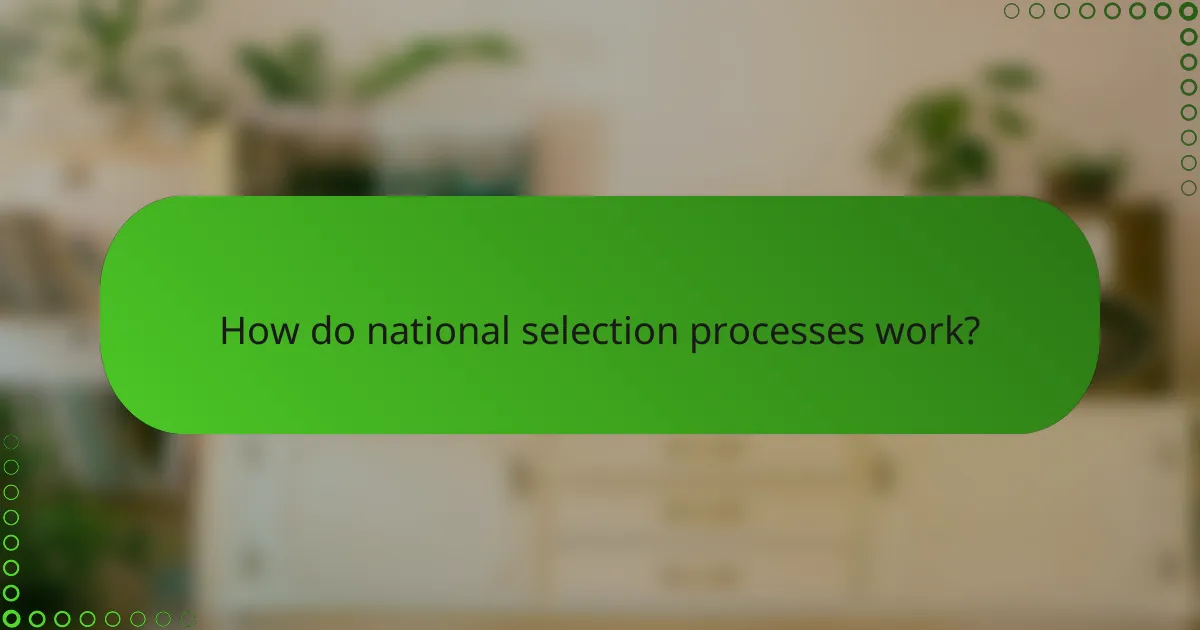
How do national selection processes work?
National selection processes for Eurovision involve various methods through which countries choose their representatives for the contest. These processes can include public voting, jury selection, or a combination of both, depending on each country’s rules and traditions.
Overview of national selection formats
National selection formats can vary significantly, with some countries opting for televised competitions while others may use internal selections. Common formats include national finals, where multiple artists compete, and direct appointments, where a single artist is chosen by a national broadcaster.
In many cases, public voting plays a crucial role, allowing fans to influence the outcome. This can be done through phone votes, SMS, or online platforms, often combined with jury votes to ensure a balanced decision-making process.
Examples of countries with unique selection methods
Sweden is known for its Melodifestivalen, a multi-week competition featuring numerous artists, which culminates in a grand final. This format has become a staple of Swedish culture and is widely followed by fans across Europe.
In contrast, Italy’s Sanremo Music Festival serves as both a music competition and a means to select its Eurovision representative. The winner of Sanremo typically earns the right to represent Italy, showcasing a blend of traditional music and contemporary pop.
Some countries, like France, have adopted a hybrid approach, incorporating both public voting and jury input to select their Eurovision entries, reflecting a balance between audience engagement and expert opinion.
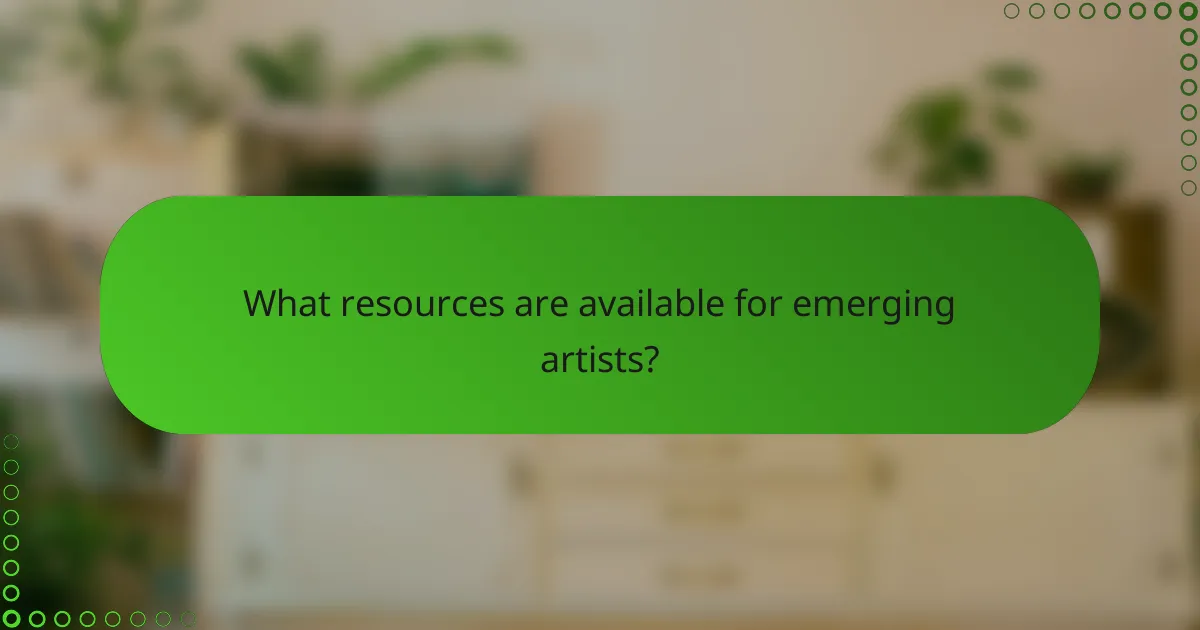
What resources are available for emerging artists?
Emerging artists can access a variety of resources to support their participation in Eurovision, including funding opportunities and workshops. These resources are designed to help artists navigate the complexities of the competition and enhance their chances of success.
Funding opportunities for Eurovision entries
Funding for Eurovision entries can come from multiple sources, including national broadcasters, arts councils, and private sponsors. Many countries have specific grants or competitions aimed at supporting emerging talent, often providing financial assistance that can range from a few hundred to several thousand euros.
Artists should research their local music industry and reach out to organizations that offer funding. It’s essential to prepare a compelling application that outlines the project’s vision, budget, and potential impact. Avoid common pitfalls like vague proposals or insufficient detail in budget breakdowns.
Workshops and mentorship programs
Workshops and mentorship programs are invaluable for emerging artists looking to refine their skills and gain industry insights. These programs often cover songwriting, performance techniques, and stage presence, helping artists prepare for the Eurovision stage.
Many national music organizations and Eurovision-related initiatives offer these programs, sometimes free of charge or at a low cost. Participating in these workshops can provide networking opportunities and access to experienced mentors who can guide artists through the competition process. Artists should actively seek out these opportunities and engage fully to maximize their learning experience.
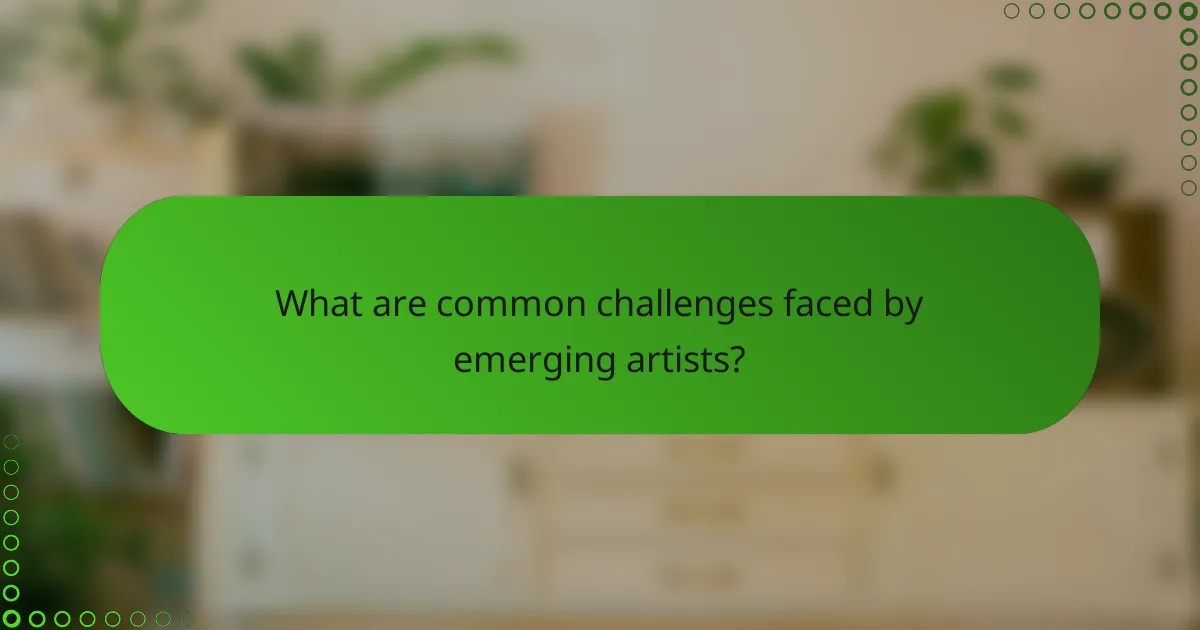
What are common challenges faced by emerging artists?
Emerging artists often face significant challenges that can hinder their progress in the music industry. Key obstacles include competition from established artists and budget constraints for production, both of which can limit visibility and opportunities for growth.
Competition from established artists
Emerging artists frequently struggle against well-known musicians who have established fan bases and industry connections. This competition can make it difficult for new talent to gain airtime, secure performance slots, or attract media attention.
To navigate this challenge, emerging artists should focus on developing a unique sound or style that sets them apart. Engaging with niche audiences through social media and local performances can help build a loyal following, even in a crowded market.
Budget constraints for production
Many emerging artists operate with limited budgets, which can restrict their ability to produce high-quality recordings, music videos, or promotional materials. This financial limitation often results in lower production values that may not compete well with more polished works from established artists.
To manage budget constraints, emerging artists can explore cost-effective solutions such as collaborating with local producers or utilizing home recording equipment. Crowdfunding platforms can also be a viable option to raise funds for specific projects, allowing artists to maintain creative control while securing necessary resources.
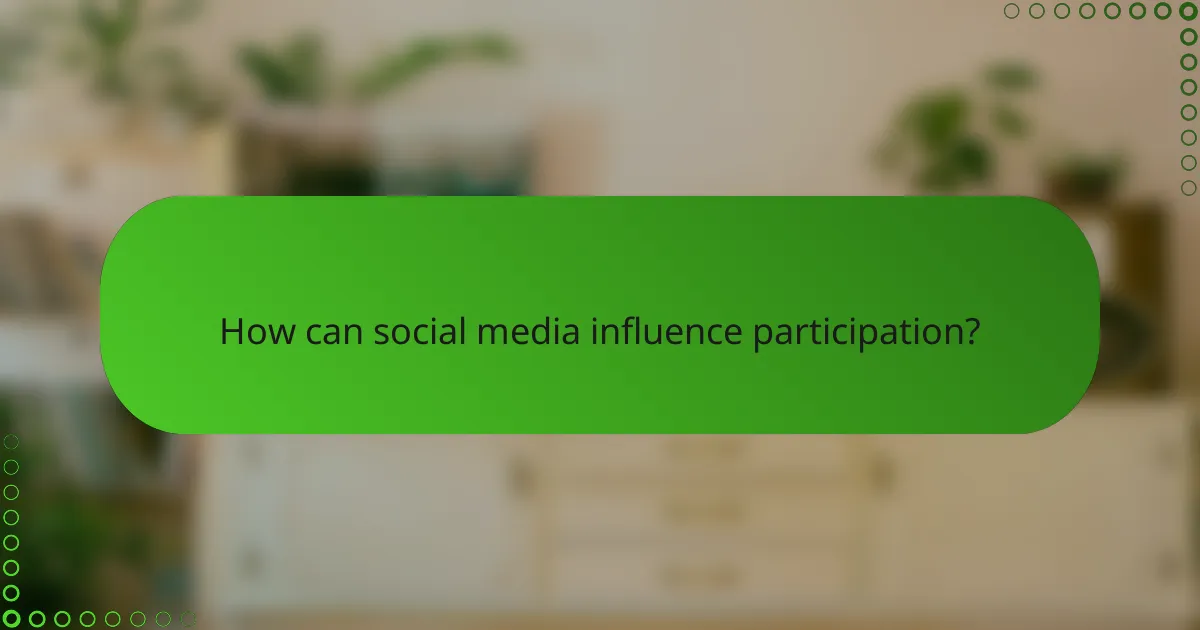
How can social media influence participation?
Social media significantly impacts participation in Eurovision by enabling emerging artists to connect with fans and promote their music. Platforms like Instagram, TikTok, and Twitter allow artists to share their journey, engage with audiences, and build a supportive fanbase.
Building a fanbase through platforms
To effectively build a fanbase, emerging artists should focus on creating engaging content that resonates with their target audience. Regularly posting updates, behind-the-scenes footage, and personal stories can help foster a sense of community. Utilizing hashtags related to Eurovision can also increase visibility and attract new followers.
Artists should consider diversifying their presence across multiple platforms. For instance, TikTok is ideal for short, catchy performances, while Instagram can showcase polished visuals and longer narratives. This multi-platform approach allows for broader reach and engagement.
Engagement strategies for Eurovision promotion
Engagement strategies are crucial for promoting participation in Eurovision. Artists should interact with fans through live Q&A sessions, polls, and contests, which can create excitement and anticipation. Collaborating with other artists or influencers can also amplify reach and introduce the artist to new audiences.
Additionally, artists should leverage user-generated content by encouraging fans to share their own interpretations of their songs or performances. This not only boosts engagement but also creates a sense of ownership among fans, enhancing their loyalty and support.
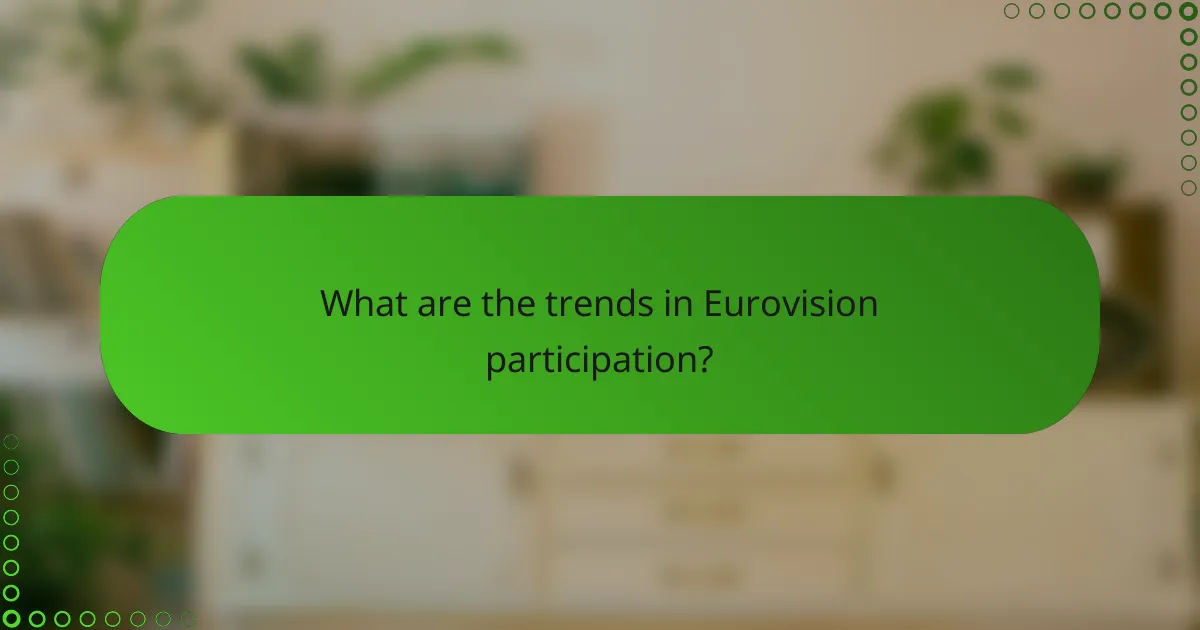
What are the trends in Eurovision participation?
Eurovision participation is increasingly characterized by a broader representation of musical styles and cultural backgrounds. Emerging artists are taking advantage of this trend to showcase diverse genres and unique narratives, making the competition more vibrant and inclusive.
Increased diversity in music genres
The Eurovision Song Contest has seen a significant rise in the variety of music genres represented. From pop and rock to hip-hop and traditional folk, artists are exploring different sounds and styles, appealing to a wider audience. This shift encourages emerging artists to experiment with their musical identity.
For instance, countries like Italy and Ukraine have successfully integrated regional styles into their entries, which has resonated well with both juries and viewers. Emerging artists should consider blending their local musical influences with contemporary trends to stand out in the competition.
When preparing for Eurovision, artists should focus on authenticity and originality in their music. This means not only choosing a genre that reflects their personal style but also ensuring that their performance captures the essence of their cultural background. A unique sound can be a powerful tool in attracting attention and votes.
